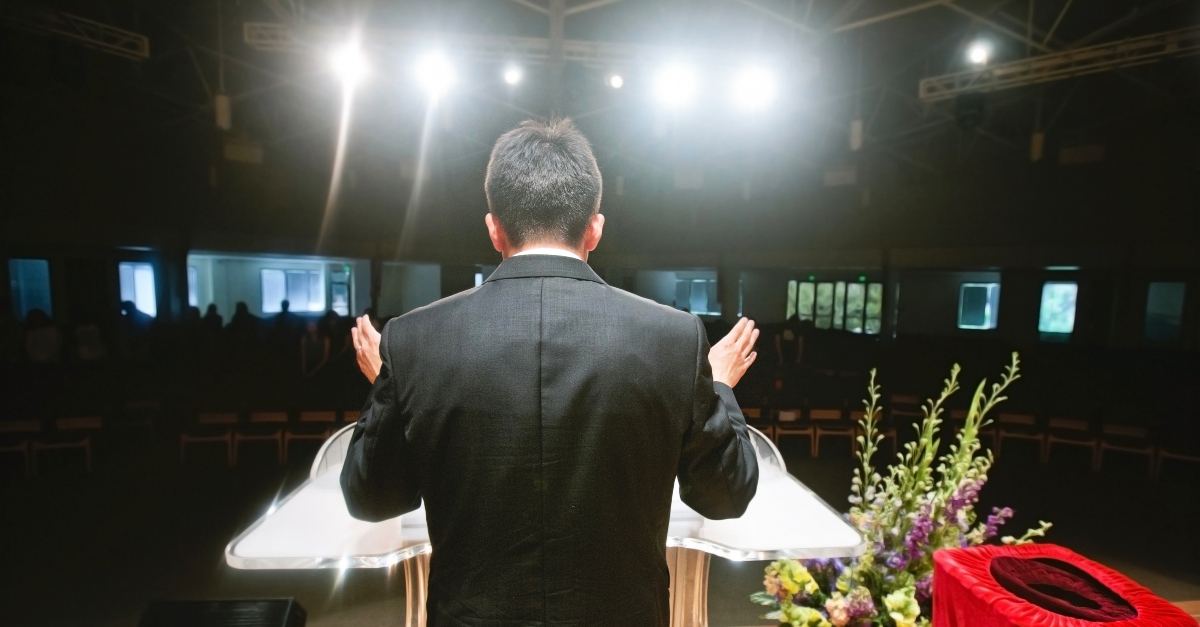How to Prevent False Teachers from Infiltrating Your Church
Pastors

Audio By Carbonatix
4:30 AM on Monday, September 1
By Denise Kohlmeyer, Pastors
Unfortunately, this is unpreventable, as Scripture makes it clear that false teachers are sneaky. They are impossible, at least at first, to be recognized for who they really are, because they wear “disguises.” Not outward disguises, like a mask, a badge, or special clothing. Satan is cleverer than that. He masquerades as an “angel of light” and his demonic minions as servants of righteousness (2 Corinthians 11:14, 15). Indeed, their disguises are subtle, but no less insidious.
At first, false teachers—who are under the directive of Satan, who will have “nothing to do with the truth, because there is no truth in him” (John 8:44)—will manifest characteristics and behaviors that align with Scripture. They will outwardly express and exhibit fruits of the Spirit (Galatians 5:22-23): love, compassion, kindness, gentleness, self-control, etc. They will not only preach the “narrow way” of righteousness and holiness but seemingly walk in it, as well. They will, by all appearances, look like bona fide sheep rather than the wolves that they are. They blend in as part of the holy flock.
So how can one detect a false teacher, then? Jesus says it is by “by their fruits” (Matthew 7:15-16a). Those “fruits” will be evidenced over time, in the things that they speak—telling lies, spreading gossip, sowing discord, mistrust, and disunity among church members—and what they teach regarding doctrine and the gospel. Sadly, by the time they are detected, much damage and destruction has already been done.
So, while we can’t prevent false teachers from entering our churches, we instead need to be “aware,” Jesus says in Matthew 7:15. To be aware means “to consider, to perceive,” as in mentally seeing. Says Strong’s Concordance, “This is akin to the expressions: ‘I see what you mean,’ or ‘I see what you are saying.’”
There are many factors that go into learning how to “perceive” when a false teacher has infiltrated your church.

Photo Credit: ©GettyImages/Javier_Art_Photography
1. Know Scripture
“To spot a counterfeit, study the real thing,” says Gotquestions.org. “Any believer who ‘correctly handles the word of truth’ (2 Timothy 2:15) and who makes a careful study of the Bible can identify false doctrine… Only by being thoroughly familiar with the truth will we be able to recognize a counterfeit.”
Maturation in and saturation of the Scriptures enables believers to stand firm in God’s truth and not be “tossed to and fro by the waves and carried about by every wind of doctrine, by human cunning, by craftiness in deceitful schemes” (Ephesians 4:13-14). To that end, we would do well to imitate the noble Berean Jews of Acts 17:11b, “for they received the message with great eagerness and examined the Scriptures every day to see if what Paul said was true” (emphasis mine).
2. Know their M.O.
Scriptures not only teach truths about God but truths about counterfeit teachers, which enables believers to spot them based on their motus operendi:
- They speak presumptuously in Jesus’ name (Deuteronomy 18:20).
- They teach commands contrary to God’s commands (Deuteronomy 18:20);
- They speak in the name of other gods (Deuteronomy 18:20).
- They see false visions and speak “lying divinations, idolatries, and delusions of their minds” (Ezekiel 13:9, 14).
- They perform “great signs and wonders” (i.e. miraculous healings) in order to deceive (Matthew 24:24).
- They teach what people want to hear and speak the “viewpoint of the world,” whether culturally, politically, or socially (2 Timothy 4:3-4; 1 John 4:5).
- They are ambitious and greedy. They “distort the truth in order to draw away disciples after them” for “the sake of dishonest gain” (Acts 20:30; Titus 1:11).
- They are self-aggrandizing. “Everything they do is done for people to see…they love the place of honor…they love to be greeted with respect” (Matthew 23:5-6).
- They “appear to people as righteous but on the inside are full of hypocrisy and wickedness” (Matthew 23:28).
- They “cause dissensions and hindrances contrary to the teaching which you learned” (Romans 16:17, Galatians 1:8).
- They are “devoted to myths and endless genealogies,” which promote “controversial speculations” (1 Timothy 1:4).
- They have “departed… from a pure heart and good conscience” and instead turn to “meaningless talk” (1 Timothy 1:5).
- They are ignorant about truth, yet they still desire to be teachers (1 Timothy 1:7).
- They do not acknowledge Jesus as coming from God (1 John 4:3).
- They do not listen to the truth (1 John 4:6).
- They “secretly introduce destructive heresies, even denying the sovereign Lord who bought them” (2 Peter 2:1).
- They exhibit “depraved conduct” and “are themselves slaves of depravity” (2 Peter 2:2, 19).
- They are hypocrites and “do not practice what they preach” (Matthew 23:3).
- They exploit believers with “fabricated stories” (2 Peter 2:3).
- They are blasphemous “in matters they do not understand” (2 Peter 2:12).
- They use “smooth and flattering speech” to deceive (Romans 16:18).
- They “promise freedom,” “mouth empty, boastful words,” and appeal to the “lustful desires of the flesh” (2 Peter 2:18, 19).
[NOTE: Modern-day false teachers use other platforms, as well: literature, podcasts, YouTube, and social media. Principals in this article apply to them, too.]
3.Test every teacher and their teachings
The Apostle John cautioned believers to “not believe every spirit but test the spirits to see whether they are from God, for many false prophets have gone out into the world” (1 John 4:1, emphasis added). Just as it is important to know what false teachers teach (#2 above), it is equally imperative to know what they don’t uphold:
- That God is three Persons: Father, Son, and Holy Spirit (Matthew 28:18–20, and 2 Corinthians 13:14).
- That the Bible is the inspired, infallible word breathed by God (2 Timothy 3:16-17).
- That all of mankind is born in sin, and that not one if good, not even one (Romans 3:10-12).
- That Jesus was sent “from God,” conceived of the Holy Spirit and born “in the flesh” of a virgin (John 5:30; Luke 1:26-38; Matthew 1:18-25).
- That Jesus came to seek and save the lost, to die upon a cross for the forgiveness of sins (Luke 19:10).
- That repentance is required for the forgiveness of sins, and that salvation is by God’s grace through faith in Christ’s atonement (Luke 3:8-14; Acts 26:20; Ephesians 2:8-9).
- That Jesus died, rose again, ascended into heaven and is seated beside his Father (Luke 24:46-47; Ephesians 1:20).
- That Jesus will return to defeat Satan once and for all (John 14:1-3).
- That those “in Christ” will reign forever with Jesus on the New Earth (Matthew 25:31-46).
Those who do not teach the above are, Paul says, “detestable, disobedient, and unfit for doing anything good” (Titus 1:16). Do not, under any circumstance and no matter the platform they use to teach—Sunday School, Bible Study, podcast, YouTube, social media—give ear to them.
Here are 6 things to do if you suspect someone in your church of being a false teacher:

Photo Credit: ©iStock/Getty Images Plus/Hotaik Sung
1. Listen and Observe
If you suspect someone of being a false teacher within your church, take some time to listen and observe them first before bringing an accusation against them. Consider recording their unbiblical teachings and/or inappropriate actions on paper to gather sufficient evidence before taking the matter to church leaders. Also observe their attitude and demeanor. Are they proud, conceited, and act like a know-it-all? How do they respond when corrected with truth? Do they get defensive and angry, or are they humble and grateful?
2. Pray
Before taking this serious matter to your church leaders, pray for wisdom, for the right heart attitude (one of humility, love, and gentleness (Galatians 6:1)), for the appropriate words (Colossians 4:6). The last thing you desire is to be a gossip and slanderer and thus heap sin upon yourself.
3. Alert Church Leaders
“If your brother or sister sins, go and point out their fault, just between the two of you. If they listen to you, you have won them over. But if they will not listen, take one or two others along, so that ‘every matter may be established by the testimony of two or three witnesses.’” (Matthew 18:15-16).
Teaching counterfeit gospels or doctrines falls under the category of sin since they subvert the truth and thus lead people away from genuine salvation through grace, not toward it. In fact, Paul declares that anyone who preaches a “gospel contrary to the one you received, let him be accursed” (Galatians 1:9). It is egregious to God that lies are purported as truth and so deceive people. This is why it is imperative that church leaders, God’s earthly shepherds, be informed.
4. Confront, Rebuke, and Silence Them
“Rebuke them sharply, so that they will be sound in the faith” (Titus 1:13).
“Must be silenced” (Titus 1:11).
Jesus set the example for boldly confronting false teachers. Many times, he called out the self-righteous, hypocritical Pharisees and Sadducees for laying heavy, works-based laws upon the Jews, which they themselves did not follow (Matthew 23:4). Nor did Jesus mince words, using such epithets as “blind guides,” “hypocrites,” “whitewashed tombs,” “brood of vipers” (Matthew 3:7; 23:15, 23, 27).
While we shouldn’t hurl such epithets ourselves, we are called to courageously confront and silence the “Pharisees” and “Sadducees” in our midst to preserve truth, protect the flock, and promote unity within the body of Christ.
5. Expose Them Publicly
“If they still refuse to listen, tell it to the church (Matthew 18:17a).
“Have nothing to do with the fruitless deeds of darkness, but rather expose them” (Ephesians 5:11).
If Steps 1 through 4 are followed, then sufficient opportunity has been given for this person to acknowledge their error, repent of it, and change their ways. However, most will refuse correction and restoration because they are bent on their own selfish agenda. At this point, church leaders have a difficult responsibility. They must expose and denounce this person publicly, before the entire church. Does this mean naming the person? It would appear so, given Paul’s example in 2 Timothy 2:17 and 3:8.
6. Avoid Them
If they refuse to listen even to the church, treat them as you would a pagan or a tax collector” (Matthew 18:17b).
“Avoid them” (Romans 16:17).
So dangerous are these people, that Paul instructs that they be removed immediately from the church and that believes are to avoid associating with them completely. Removal from the church and disassociation, again, are the drastic but necessary means by which the body of Christ remains pure and correct doctrine upheld.
What Is the Ultimate End for False Teachers?
“You serpents, you brood of vipers, how are you to escape being sentenced to hell?” (Matthew 23:32).
“They have been under a sentence of death for a long time. The God who will destroy them has not been sleeping” (2 Peter 2:3).
“They will be paid back with harm for the harm they have done…blackest darkness is reserved for them.” (2 Peter 2:13, 17).
“Every tree that does not bear good fruit is cut down and thrown into the fire” (Matthew 7:19).
God is not unaware of the devastating spiritual destruction these false teachers have done. Nor is God immune to the pain and suffering they have caused untold, immature, ignorant, and weak believers. Just retribution will be dealt to them, if not here on earth, then in the hereafter.
Conclusion
Scriptural knowledge, vigilance, and an uncompromising adherence to God’s Word and the true Gospel is a church’s best defense against the dangerous influence of false teachers. Acknowledging and upholding truth while recognizing and rejecting deception is the ministry and responsibility of every God-fearing church leader and member, alike.
As Pastor John Piper says, “The best way to protect ourselves from false teachers is to be part of a healthy, Bible-preaching church, and to be prayerfully saturated with the Bible every day.”
Related Resource: Shrinking the Integrity Gap: Helping Leaders Live Out What They Preach
There’s an old quote that still rings true today, “More than 70% of leaders do not finish well.” Unfortunately, we so often see those with big followings, platforms, and pedestals fall or stumble due to something being done in private. If you're a leader in your church or a friend to a leader, this is an episode of The Built Different Podcast that you do not want to miss. If you like what you hear, be sure to subscribe to The Built Different Podcast on Apple, Spotify or YouTube so you never miss an episode!
Photo Credit: ©GettyImages/Rawpixel
 Denise is a former newspaper reporter and current freelance writer. She has been published in numerous online and print publications. She is also a former Women's Bible Study teacher. Denise's passion is to use her writing to bless, encourage, and inform others. She lives outside of Chicago with her husband and two children (another has grown and flown). You can find Denise at denisekohlmeyer.com.
Denise is a former newspaper reporter and current freelance writer. She has been published in numerous online and print publications. She is also a former Women's Bible Study teacher. Denise's passion is to use her writing to bless, encourage, and inform others. She lives outside of Chicago with her husband and two children (another has grown and flown). You can find Denise at denisekohlmeyer.com.


